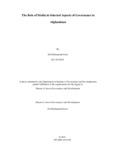| dc.contributor.advisor | Khan, Niaz Ahmed | |
| dc.contributor.author | Liwal, Eid Mohammad | |
| dc.date.accessioned | 2021-10-18T05:26:53Z | |
| dc.date.available | 2021-10-18T05:26:53Z | |
| dc.date.copyright | 2021 | |
| dc.date.issued | 2021 | |
| dc.identifier.other | ID 18372011 | |
| dc.identifier.uri | http://hdl.handle.net/10361/15327 | |
| dc.description | This thesis is submitted in partial fulfillment of the requirements for the degree of Masters of Arts in Governance and Development, 2021. | en_US |
| dc.description | Cataloged from PDF version of thesis report. | |
| dc.description | Includes bibliographical references (pages 65-68). | |
| dc.description.abstract | This study considers the implications and role of media with special reference to the role of Television
and Radio within the context of Afghan government. Notwithstanding the growing significance of the
media for a country’s overall development, there has been very limited research and academic attention on
the media in the Afghan context in development.
The objective of this paper is to analyze the media’s role (Radio and Television) in relation to selected
sectors of governance affairs – notably Human Rights and Public Awareness. The relevance of the issue
and the importance to the Afghan context is analyzed. Some of the major areas of focus and discussion
topics of the study include the following: an analysis of the relevant needs and gaps in the concerned
public organizations; a scrutiny of the media’s (Television & Radio) role and implications for selected key
governance issues in Afghanistan; contributions and challenges of the media in relation to enforcement,
protection and promotion of human rights and public awareness; relevant human rights laws and access to
information for public awareness; and the strengths and weaknesses of the media in capacity building of
the media practitioners to contribute to the broader governance of the country.. The major research
methods and tools included secondary literature review, desk review of official documents, and key
informant interviews with a cross section of stakeholders including the media personnel, local and central
government officials, and academics.
The findings reveal some major limitations of the media including inadequate perusal ethics and other
scrupulous codes, inadequate academic and professional qualifications, and a low degree of
professionalism among a considerable number of media practitioners and associated policymakers. Acting
together, these limitations influence the state of overall governance badly. It is also found that the issues
of civil and political rights are often neglected by the media. The media’s focus on national and local
elections have not been strong. As newly emerged democratic society, elections are crucial for the
country. It is noted that the media coverage of, and interest in elections have been very little. There seems
to be several reasons behind this aversion. The absence of a strong democratic political culture and active
participation of political parties, together with the unscrupulous interventions in the democratic process by
the warlords have left a negative mark on the media, and most of the press remain less interested in
discussing civil and political rights.
Drawing on the examples of other democratic nations, this study reiterates the crucial significance of the
media in the national development of Afghanistan, and nurturing its nascent democratic culture. Some
major recommendations include the following: making appropriate policy provisions for attracting more
local and foreign investors to move into the media sector; conducting a media-based mass awareness
campaign to educate people on human rights related issues; and capacity development of the media
personnel to enable them to carry out their stipulated role professionally and efficiently. | en_US |
| dc.description.statementofresponsibility | Eid Mohammad Liwal | |
| dc.format.extent | 68 pages | |
| dc.language.iso | en | en_US |
| dc.publisher | Brac University | en_US |
| dc.rights | Brac University theses are protected by copyright. They may be viewed from this source for any purpose, but reproduction or distribution in any format is prohibited without written permission. | |
| dc.subject | Media’s role | en_US |
| dc.subject | Afghan community | en_US |
| dc.subject | Governance | en_US |
| dc.subject | Human rights | en_US |
| dc.subject | Public awareness | en_US |
| dc.subject | Television and Radio | en_US |
| dc.subject.lcsh | Mass media -- Governance | |
| dc.title | The role of media in selected aspects of governance in Afghanistan | en_US |
| dc.type | Thesis | en_US |
| dc.contributor.department | Brac Institute of Governance and Development, Brac University | |
| dc.description.degree | M. Governance and Development | |

